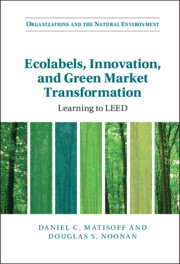Book contents
- Ecolabels, Innovation, and Green Market Transformation
- Organizations and the Natural Environment
- Ecolabels, Innovation, and Green Market Transformation
- Copyright page
- Dedication
- Contents
- Figures
- Tables
- Preface
- 1 Advancing a Perspective of Green Market Transformation
- 2 The Architecture of Green Building Policies and Practice
- 3 Choose Your Own Adventure!
- 4 The Labeling Building Challenge
- 5 The Public and Private Benefits of Green Building
- 6 Tossing a Pebble in a Pond
- 7 Demonstrating Innovation in Green Buildings
- 8 Keep Raising the Bar
- 9 It’s Not Easy Being Green
- 10 A Blueprint for Green Market Transformation
- 11 Conclusions
- Index
- References
3 - Choose Your Own Adventure!
The Landscape of Ecolabel Design
Published online by Cambridge University Press: 27 October 2022
- Ecolabels, Innovation, and Green Market Transformation
- Organizations and the Natural Environment
- Ecolabels, Innovation, and Green Market Transformation
- Copyright page
- Dedication
- Contents
- Figures
- Tables
- Preface
- 1 Advancing a Perspective of Green Market Transformation
- 2 The Architecture of Green Building Policies and Practice
- 3 Choose Your Own Adventure!
- 4 The Labeling Building Challenge
- 5 The Public and Private Benefits of Green Building
- 6 Tossing a Pebble in a Pond
- 7 Demonstrating Innovation in Green Buildings
- 8 Keep Raising the Bar
- 9 It’s Not Easy Being Green
- 10 A Blueprint for Green Market Transformation
- 11 Conclusions
- Index
- References
Summary
This chapter offers a theoretical framework to understand the variation of ecolabel design based on the content, governance, and context of the label.Drawing upon green clubs and signaling theories, we suggest that ecolabels vary based on the stringency of the certification program, measured by the number and criticality of required standards, and the extent to which the requirements of these certifications incentivize the provision of public goods. We characterize important dimensions of ecolabels such as their impact, the value of the signal, and the extent to which they address externalities and information asymmetries. To illustrate these concepts, we take a closer look at GreenCo, a business sustainability rating system in India, and a sample of over 50 different agricultural ecolabels. This examination shows the important variation in factors like types of requirements, stringency, and institutional processes that govern the labels. Perhaps unsurprisingly, broader stakeholder engagement is associated with more emphasis on public benefits, while more surprisingly industry sponsorship does not tend to be found among the more lax labels with less public benefit.
Keywords
- Type
- Chapter
- Information
- Ecolabels, Innovation, and Green Market TransformationLearning to LEED, pp. 62 - 92Publisher: Cambridge University PressPrint publication year: 2022

